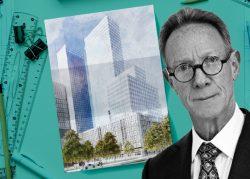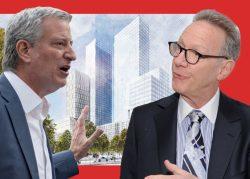A controversial high-rise development in Crown Heights has been halted once again.
A proposal by Ian Bruce Eichner’s Continuum Company to rezone a former spice factory at 960 Franklin Avenue has been delayed by a lawsuit from a neighborhood activist over the virtual hearing process. Kings County Supreme Court Judge Katherine Levine authorized a temporary restraining order last week, putting a hold on the rezoning process for now.
Opponents of the project claim that its two towers, which could top out at more than 30 stories, will cast plant-harming shadows over the Brooklyn Botanic Garden.
The lawsuit was brought by a group of activists led by Alicia Boyd, who argued that the virtual hearings violate the city’s rules for conducting its public land use review process. Boyd said the hearings are prohibitive to community members without internet access.
Continuum Company and Eichner did not return requests for comment.
Read more



Brooklyn Paper first reported the news.
This is the second time a rezoning in Brooklyn has been delayed due to concerns over virtual hearings.
The city’s plan to rezone 80 blocks in Gowanus was held up after Justice Levine authorized a temporary restraining order in January after opponents lodged a similar complaint regarding virtual hearings. The judge partially lifted the TRO later that month, allowing the city to file its application for the project.
In Crown Heights, Eichner is seeking to build two 39-story towers with 1,578 rentals, half of which would be affordable. That plan was nixed after Mayor Bill de Blasio said he would oppose the developer’s proposal, calling it “grossly out of scale with the neighborhood” and would inhibit plant growth at the garden. It was a reversal for de Blasio, who previously supported the project.
The City recently reported that the developer is now pitching a project that tops out at 17 stories, but with far fewer affordable apartments. Either way, the rezoning would need to go through the city’s lengthy ULURP process and would need to get approval from the City Council and, ultimately, the mayor.
The developer also suggested that it could simply move forward with an as-of-right project, which would have 518 condominiums and no affordable housing. That development would not require going through the land use review process.
